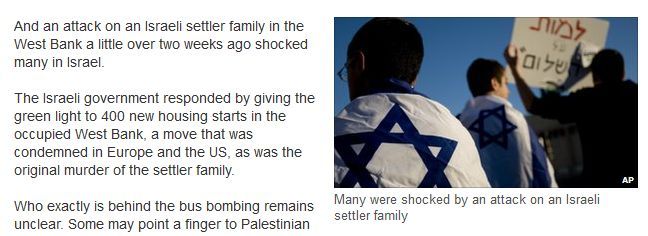Nothing captures the media’s attention like a bomb in the heart of Jerusalem. At this time, one person was killed and over 30 wounded as a bomb detonated next to a busy bus stop near the city’s central bus station and international conference center.
Incredibly, Reuters included the following in its report:
Police said it was a “terrorist attack” — Israel’s term for a Palestinian strike. It was the first time Jerusalem had been hit by such a bomb since 2004.
We’ve long criticized Reuters for its refusal to call terror by its name.
Now, Reuters appears to be attributing the term “terrorism” as something solely in the minds of Israelis. In February 2011, Thomson Reuters CEO Tom Glocer announced the appointment of new Editor-in-Chief Stephen Adler saying:
Our news organization is now poised to advance to new levels of excellence in an industry which is moving very fast.
Reuters certainly appears to be moving very fast and reaching new levels – just not in the area of excellence.
The Atlantic’s Jeffrey Goldberg hits the nail on the head in response:
Those Israelis and their crazy terms! I mean, referring to a fatal bombing of civilians as a “terrorist attack”? Who are they kidding? Everyone knows that a fatal bombing of Israeli civilians should be referred to as a “teachable moment.” Or as a “venting of certain frustrations.” Or as “an understandable reaction to Jewish perfidy.” Or perhaps as “a very special episode of ‘Cheers.'” Anything but “a terrorist attack.” I suppose Reuters will mark the 10th anniversary of 9/11 by referring to the attacks as “an exercise in urban renewal.”
The mind reels.
BBC: Terrorism Targets Inanimate Objects
The initial headline of a story says a lot about the thought process of a news editor. While most other news organizations covered a bomb blast in Jerusalem by focusing on the number of casualties as well as the location, the BBC went with this:

According to the BBC, it wasn’t Israelis, Jews, innocent Jerusalem residents or anyone else that a terrorist usually targets. No – it was a bus stop, an inanimate object fixed on the sidewalk.
The BBC’s interest in victims of the bombing was seemingly only piqued by the announcement that the 59 year old woman killed by the bomb was a British tourist. Of course, one of the first rules of foreign reporting is to find a local angle. Yet it is noteworthy how the BBC is so usually disconnected from the human side of Israeli victims of terror and from the horror of those acts.
Evidence of this appeared in a related analysis penned by the BBC’s Jonathan Marcus. The brutal murders of the Fogel family warranted barely a few lines and were simply referred to as “an attack on an Israeli settler family“. Note also the choice of image to illustrate the incident. Once again the BBC could not bring itself to humanize the victims by publishing a photo of the murder victims or the associated mourning.

And what about Sky News, which has recently been on a downward spiral in its reporting from Israel?:

Its initial headline was not much better than the BBC but at least Sky later updated its story to read: “One Killed, 30 Hurt, In Israel Bus Stop Blast“.
Associated Press also produced something similar to the BBC:

Sadly, for some media outlets, it appears that it’s still too much to acknowledge the reality of terror or the reality of its victims. The bus stop in question may have been the location of the bomb but it certainly wasn’t the object of the terrorists’ hatred.
Meanwhile at the New York Times…
Could we find a more blatant example of promoting a moral equivalence between Palestinian terrorism and Israeli self-defense than that tweeted by the New York Times columnist Nicholas Kristof? Probably not.

Send your considered comment to Reuters through its online feedback form.
Send your considered comments to the BBC Complaints website. For more on how to navigate the complaints process, click here for our guide on how to make a complaint to the BBC.



